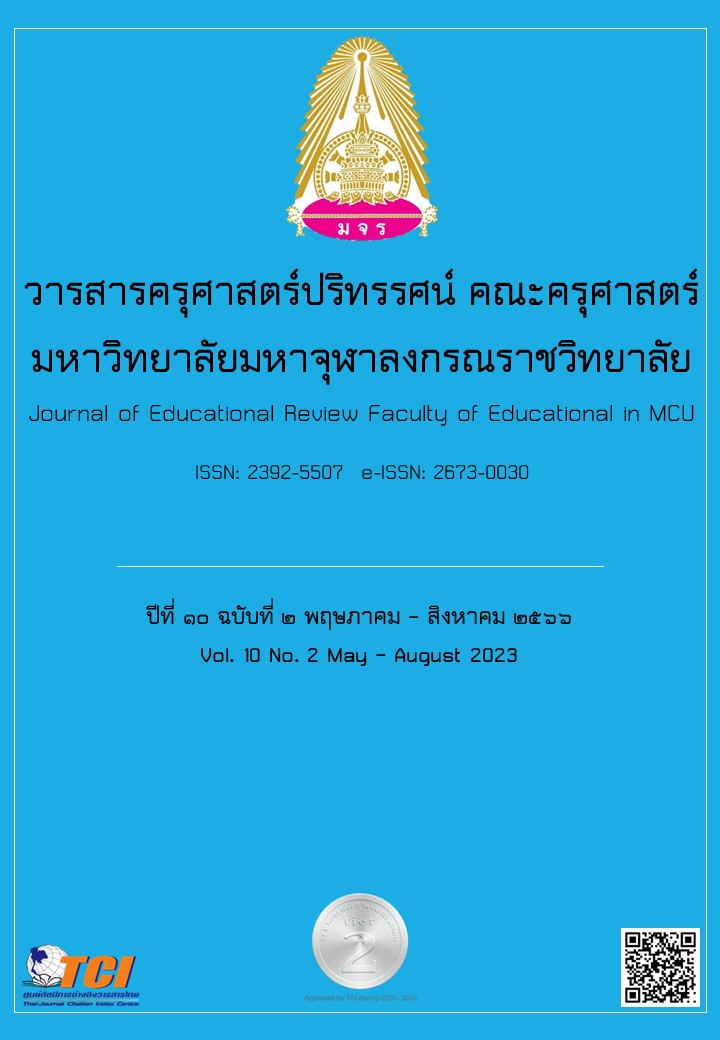THE IMPACT OF TRAINING ON THE DEVELOPMENT OF EDUCATIONAL BOARD GAMES AFFECTING ACCEPTANCE AND PERCEPTION OF SELF-EFFICACY AMONG TEACHERS AT RATTANAKOSIN SCHOOL GROUP
Main Article Content
Abstract
This research article was an experimental study with the following research objectives: 1) To compare the self-efficacy perception of teachers at Rattanakosin School Group before and after the training on the development of educational board games; 2) To investigate the ability of teachers at Rattanakosin School Group to create educational board games; 3) To examine the level of acceptance of educational board games among teachers at Rattanakosin School Group; and 4) To explore the factors influencing the acceptance of educational board games among teachers at Rattanakosin School Group. The sample group consisted of 74 teachers from Rattanakosin School Group, selected using cluster sampling. The research instruments used included 1) a training plan for creating educational board games, 2) an evaluation form for assessing the quality of educational board games created, 3) a questionnaire on the acceptance of educational board games, and 4) a questionnaire on self-efficacy in creating educational board games. The research findings revealed that: 1) After the training on the development of educational board games, teachers at Rattanakosin School Group showed a significantly higher level of self-efficacy perception compared to before the training, with statistical significance at the .05 level. 2) Overall, teachers at Rattanakosin School Group demonstrated a high level of ability in creating educational board games. 3) Teachers exhibited the highest level of acceptance of educational board games (Behavior Intention variable). 4) Attitudes towards board games were found to be able to predict the behavioral intention of teachers at Rattanakosin School Group with 48% accuracy, or at a moderate level.
Article Details

This work is licensed under a Creative Commons Attribution-NonCommercial-NoDerivatives 4.0 International License.
ทัศนะและความคิดเห็นที่ปรากฏในบทความในวารสารฉบับนี้ถือเป็นความรับผิดชอบของผู้เขียนบทความนั้นเพียงผู้เดียว และไม่ถือเป็นทัศนะและความรับผิดชอบของกองบรรณาธิการ
กองบรรณาธิการขอสงวนสิทธิ์ในการคัดเลือกบทความลงตีพิมพ์และจะแจ้งให้เจ้าของบทความทราบหลังจากผู้ประเมินบทความตรวจอ่านบทความแล้ว
ต้นฉบับที่ได้รับการตีพิมพ์ในวารสารครุศาสตร์ปริทรรศน์ คณะครุศาสตร์ มหาวิทยาลัยมหาจุฬาลงกรณราชวิทยาลัย ถือเป็นกรรมสิทธิ์ของคณะครุศาสตร์ มหาวิทยาลัยมหาจุฬาลงกรณราชวิทยาลัย ห้ามนำข้อความทั้งหมดหรือบางส่วนไปพิมพ์ซ้ำ เว้นเสียแต่ว่าจะได้รับอนุญาตจากมหาวิทยาลัยฯ เป็นลายลักษณ์อักษร
References
บุญชม ศรีสะอาด. (2561). การแปลผลเมื่อใช้เครื่องมือรวบรวมข้อมูลแบบมาตราส่วนประมาณค่า. วารสารการวัดผลการศึกษามหาวิทยาลัยมหาสารคาม. 2(1). 64-70.
บุญศรี พรหมมาพันธุ์. (2561). เทคนิคการแปลผลการวิเคราะห์ข้อมูลสำหรับการใช้สหสัมพันธ์และการถดถอยในการวิจัย. วารสารศึกษาศาสตร์ มสธ.. 11(1). 32-45.
รัชนีวรรณ ตั้งภักดี. (2565). การพัฒนารูปแบบการสร้างบอร์ดเกมเพื่อการศึกษาในประเทศไทย. วารสารศึกษาศาสตร์ มสธ.. 15(2). 117-132.
วรพล ยวงเงิน. (2564). การนำเกมกระดานเข้าสุ่โรงเรียน. วารสารศึกษาศาสตร์ มหาวิทยาลัยนเรศวร. 23(4). 448-463.
สฤณี อาชวานันทกุล. (2564). Board game universe V2 จักรวาลกระดานเดียว. กรุงเทพมหานคร: Salt Publishing.
Bautista, N. U., & Boone, W. J. (2015). Exploring the Impact of TeachME™ Lab Virtual Classroom Teaching Simulation on Early Childhood Education Majors’ Self-Efficacy Beliefs. Journal of Science Teacher Education. 26. 237-262.
Botes, R., & Zeeman, M. (2019). Measuring Computer Science Students’ Acceptance of Arduino Micro Development Boards as Teaching Tool. European Conference on Impact of Artificial Intelligence and Robotics, Oxford, UK.
Davis, F. D. (1989). Perceived Usefulness, Perceived Ease of Use, and User Acceptance of Information Technology. MIS Quarterly. 13(3). 319-340.
Hair, J. F., Black, W. C., Babin, B. J., & Anderson, R. E. (2014). Multivariate Data Analysis. 7ed. Pearson Education Limited.
JuhÁSz, A. (2021). Primary school teachers’ attitude to board-games and their board-game playing practice. Acta Didactica Napocensia. 14(1). 182-187.
Kuchynka, S., Reifsteck, T. V., Gates, A. E., & Rivera, L. M. (2021). Developing Self-Efficacy and Behavioral Intentions Among Underrepresented Students in STEM: The Role of Active Learning. Frontiers in Education. 6. 1-14.
Masril, M., Ambiyar, Jalinus, N., Ridwan, & Hendrik, B. (2021). Robotic Education in 21st Century: Teacher Acceptance of Lego Mindstorms as Powerful Educational Tools. International Journal of Advanced Computer Science and Applications. 12(2). 119-126.
OECD. (2018). Future of Education and Skills 2030. Curriculum Analysis Policy review on designing, planning and implementation 8th Informal Working Group (IWG) Meeting, OECD Conference Centre, Paris, France.
O'neill, D. K., & Holmes, P. E. (2022). The power of Board games for mulitdomain Learning in Young Children. American Journal of Play. 14. 58-98.
Park, E., & Kwon, S. J. (2016). The adoption of teaching assistant robots: a technology acceptance model approach. Program. 50(4). 354-366.
Plass, J. L., Homer, B. D., & Kinzer, C. K. (2016). Foundations of Game-Based Learning. Educational Psychologist. 50(4). 258-283.


